Suchergebnisse für "Factsheet%3A Energietechnologien gestalten%2C die f%C3%BCr alle sinnvoll und nutzbar sind"
Aufbau einer österreichischen EPD-Plattform für Bauprodukte
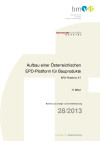
EPD-Plattform AT
Schriftenreihe
28/2013
H. Mötzel et al.
Herausgeber: BMVIT
Deutsch, 28 Seiten
Downloads zur Publikation
Energy storage systems
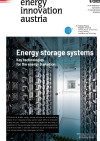
Key technologies for the energy transition
energy innovation austria
5/2021
Herausgeber: BMK in cooperation with the Climate and Energy Fund
Englisch, 16 Seiten
Downloads zur Publikation
DG DemoNetz - Konzept
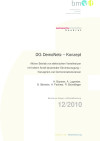
Aktiver Betrieb von elektrischen Verteilnetzen mit hohem Anteil dezentraler Stromerzeugung - Konzeption von Demonstrationsnetzen
Schriftenreihe
12/2010
H. Brunner, A. Lugmaier, B. Bletterie, H. Fechner, R. Bründlinger
Herausgeber: BMVIT
Deutsch, 198 Seiten
Downloads zur Publikation
Energy2POG - Hybrid Energy Cluster Pogusch - Renewable energies and cost-efficient operation
The aim of the project was the design, optimisation and demonstration of a hybrid energy supply system as well as optimised material flows for a restaurant and hotel business in an exposed location. The concept allows the integration of material flows into the heat and energy supply system.
LifeCycle Tower - Energy efficient prefabricated multi-storey timber houses
Based on the results of previous research projects, the project at hand deals with the development of a wooden prefabricated module construction for energy efficient office buildings with up to 20 storeys. This sustainable system ensures cost certainty through the whole life cycle of the building.
Know-How-Plus - Options and constraints of building renovation towards plus energy building standard
Aim of this research project is to identify the realizable reduction potential of energy consumption and CO2 emissions by refurbishment of the Austrian building stock towards plus energy building standard. Furthermore a construction-oriented manual will be supplied for interdisciplinary planning.
Solar Heat Worldwide: Marktbericht über Solarwärmetechnologien (Edition 2009)

Markets and Contribution to the Energy Supply 2007
Werner Weiss, Irene Bergmann, Roman Stelzer (AEE INTEC - AEE Institute for Sustainable Technologies)
Herausgeber: IEA Solar Heating & Cooling Programme
Englisch
IEA SHC Annual Report 2008

Annual Report 2008 - IEA Programme Solar Heating & Cooling, Tasks 35-40
Englisch
Smart Grids D-A-CH Taskforce Geschäftsmodelle
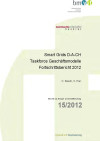
Fortschrittsbericht 2012
Schriftenreihe
15/2012
C. Resch, C. Pier
Herausgeber: BMVIT
Deutsch, 96 Seiten
Downloads zur Publikation
Film "Bauen mit Hausverstand - Das Haus der Zukunft"
Das "Haus der Zukunft" - Dokumentation über ambitionierte Pilotprojekte Jetzt mit DVD-Bestellmöglichkeit!
IEA Task 23 Optimization of Solar Energy Use in Large Buildings
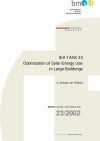
Schriftenreihe
23/2002
S. Geissler, W. Tritthart
Deutsch, 235 Seiten
Downloads zur Publikation
Solar Heating and Cooling (SHC) Task 39: Polymerwerkstoffe für solarthermische Anwendungen
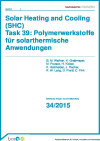
Schriftenreihe
34/2015
G. M. Wallner, K. Grabmayer, M. Povacz, H. Kicker, et al.
Herausgeber: BMVIT
Deutsch, 317 Seiten
Downloads zur Publikation
Strategies and Operator Tools for Grid Restoration with Massive Renewable Energy Sources (RestoreGrid4RES)
RestoreGrid4RES faces the future renewable based generation structure within the transformation to a renewable and ecological power supply. The project had been funded in the frame of the „Joint Programming Platform Smart Energy Systems“ (JPP SES).
Innovative Concepts for Pumped Storage in Liberalized Grids
In liberalized grids the requirements for pumped storage equipment rise dramatically. The development of a controllable pump turbine to help stabilize the grid is one of the possible solutions to this problem.
IEA ECBCS Annex 49 Midterm Report (2010)

Low Exergy Systems for High-Performance Buildings and Communities
Englisch
Eco-Services
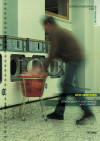
Strategies for sustainable development
Forschungsforum
4/1999
Herausgeber: BMVIT
Englisch, 6 Seiten
Downloads zur Publikation
Webinar: PVT Certification - lessons learnt when certifying PVT products
9. April 2019
online
The webinar gives an overview of the Photovoltaic/thermal Systems (PVT) certification.
solar4.alpine
solar4.alpine - an integrated concept for an ecological alpine refuge hut based on solar energy
EASEY - Ecological And Social EfficiencY
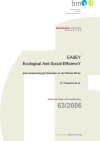
eine Anwendung als Subindex an der Wiener Börse
Schriftenreihe
63/2006
R. Paulesich et al.
Herausgeber: BMVIT
Deutsch, 112 Seiten
